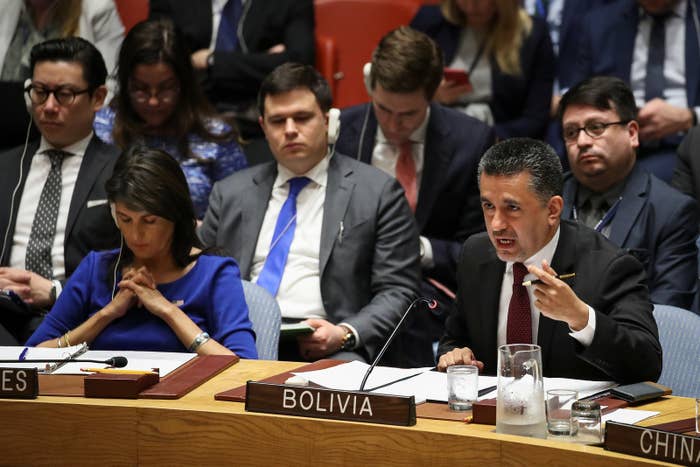
A few years ago, the US announcing it would abandon the UN Human Rights Council would have been unthinkable. But today, as most of the world — including the UN human rights chief — recoils in horror at the US government’s treatment of migrant children, “inevitable” feels more accurate.
The truth is, this is the right time for the US to step away from its seat at the Human Rights Council, as UN Ambassador to the UN Nikki Haley announced Tuesday. Under the Trump administration, the United States cannot perform the role that the world needs it to, marshaling allies — especially the members of the G7 that Trump has alienated — to push forward a clear view of universal values in the council’s resolutions. Right now, we’ve made it difficult to get even Canada on our side.
There are plenty of good reasons why the US should be trying to influence the Human Rights Council. Haley has argued — correctly — that the body allows blatant human rights violators to campaign for seats and work to block actual progress on alleviating the ills of the world. This term, the vaunted membership includes Venezuela, whose leaders are overseeing the starvation of its population as they crush democracy; Saudi Arabia, whose imprisonment of women activists after granting women the right to drive made international headlines; and Burundi, whose opinion on human rights issues may be dampened by the fact that they’re still being investigated by a body the council set up in 2016 for potential mass rights violations.
Haley has also argued — correctly — that the body focuses too heavily on Israel, which is the only state that has a permanent agenda item dedicated to it. And she has demanded that it be easier to kick human rights violators off of the council — something that’s only happened once, in 2011, when Libya was removed with UN General Assembly approval.
Those echo the arguments that the Bush administration put forward when it decided to pass on joining the newly formed Human Rights Council in 2006, a successor to the much-maligned Human Rights Committee. Then, I was a livid college freshman. When the Obama administration opted to run for a seat in 2009, which it easily won, I felt vindicated. In the years the US was on the Human Rights Council, it advanced LGBT rights, rallied its fellow democracies into promoting freedom of speech and the right to protest, and led the way in pushing for investigations into human rights violations in North Korea and Syria.
The world wasn’t scrubbed of these problems just because the US pushed a UN body to talk about them. Journalists were still arrested and demonstrators still detained. But at least the people being oppressed weren’t being silenced in the forum meant to give them a voice.
The decision to run for reelection for a seat whose term would start in 2017 must have seemed like a no-brainer to the Obama administration. Hillary Clinton would be president and would continue the policies she advocated during her time as secretary of state. But then Trump won and the calculus shifted. Haley warned last year that unless the council was reformed, the US would withdraw.
But even if the Human Rights Council was reformed in the way the Trump administration wanted, the US wouldn’t have much to contribute. While Haley herself has proved to be a vocal champion of human rights, that hasn’t translated into a shared sense of values at the top of the administration. Instead, the prevailing obsession with defending Israel has taken over, leading to the counterproductive idea that walking away would somehow shield Israel more, or strip the council of legitimacy.
But legitimacy is a funny thing. In a speech opening the Human Rights Council’s 47th session, the outgoing High Commissioner of Human Rights criticized the US’s “recently adopted policies, which punish children for their parents’ actions.”
“The thought that any state would seek to deter parents by inflicting such abuse on children is unconscionable,” he said. Recently, his office called on the US to end the policy, calling it an “arbitrary and unlawful interference in family life.”
It wouldn’t be surprising to see the US playing a central role in Human Rights Council discussions even after it leaves — the US could make its way onto the agenda as a chronic violator of human rights. And for our allies who still have a seat at the table, it would be hard to argue against.
